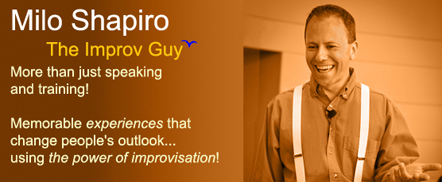"National Speakers Association" founder Cavett
Roberts was once asked by an audience member (a professional speaker
herself), "I'm not really a funny person, so do I HAVE to use humor?"
Without hesitation, Cavett replied, "No no no. You don't have to
use humor. Unless you want to get paid." After a pause to
catch his meaning, the whole audience laughed loudly, including her, as
they got his point.
Case in point: A potential client called
me, inquiring, "I've been all over your website and I like what I see
about you as a speaking coach, but I also see that you're 'The Improv
Guy'. I'm giving an hour-long presentation about Lou Gehrig's
Disease so there's no room for humor in this
program. Got it?"
"Gotcha," I responded, echoing
the fact that I knew where he was coming
from, not necessarily my agreement. I knew there were a half-dozen
other more important issues on his plate, so humor was low on my
agenda. But not off the table in my mind.
John met
with me and, over the course of several
visits, we rearranged much of his program to improve the flow, re-did a
PowerPoint that was going to yield snoozing, worked on simplifying his
wording, and lifting his delivery energy. With each visit, he
became more excited.
On his fifth visit, he burst in and said, "Okay, I can't wait to hear
what today's focus is going to be! What is it?"
I smiled
broadly and stated, "Humor!"
His face
hit the floor. "You gotta be kidding me! How clear
was I that there's no room for humor in this speech? I'll have 400
medical professionals furious at me for being so insensitive!" He
looked visibly shaken and I could see he was almost angry.
I held my hand up. "Let's start with an
absolute. We are never, ever, ever, ever, ever...going to make fun
of anyone suffering from Lou Gehrig's disease. Are you with me so
far?"
This settled him a bit. Unsurely, he
offered, "Okay..."
"Good. You're speaking to a group of people
who mostly do research. Are there some stereotypes about
researchers that we can poke fun at?"
He paused. A hint of a smile eked out.
"Yeah, we're kind of an odd bunch, actually."
"Great! How about, are there some things we
thought about Lou Gehrig's Disease once upon a time and now they seem
ridiculous, given what we've come to discover?"
His eyes opened, "Yes! Some of the early
theories DO seem funny after all this time."
We brainstormed some more and his defenses went
down. "Are you sure it's going to be okay to include these
moments?"
"There are no guarantees, but the types of humor
that we've come up with feel quite safe. What I can guarantee you
is that, without them, the program is going to seem a lot drier."
After one more appointment, he was off to
Australia to give the presentation. In the end, we'd found him
just four laugh lines in his one-hour program. Not exactly a stand-up
comedy routine, but enough to lighten up his program quite a bit.
A few days later, I got an email from him.
"I'm at the airport awaiting my flight home.
I couldn't wait to tell you that it went great! And holy cow, were
you right! I had people slapping me on the back...telling me I hit
it out of the ballpark! And saying how funny it was! I would
never have dreamed that a mere four laughs in an hour would make such a
difference!"
I wrote back, "I'm curious: How many laughs there were
in the rest of the three-day conference combined?"
Within minutes, he wrote back, "None. My
speech yielded the only signs of life in the audience in the whole
conference."
My reply: "After you made them laugh once ten
minutes in and then again about 25 minutes in, you had them through all
of the drier material, because they were waiting on the next laugh.
And then you came through not once, but twice more. And it's not
about how much they laughed, John. It's about the fact that they
were paying attention to everything else because of it."
After his flight, I heard back once more:
"So true. Thank you for not playing into my fear of humor.
The other stuff we did probably made a bigger difference overall, but
I'm so glad you didn't let me scare you off on humor because it was like
the cherry on top of it all."
I've seen humor succeed in presentations on
cancer, accounting, internal auditing, labor cut-backs, and even
eulogies. If it can work with these situations, I'm hard-pressed
to believe it can't work for almost anything...when used wisely.

